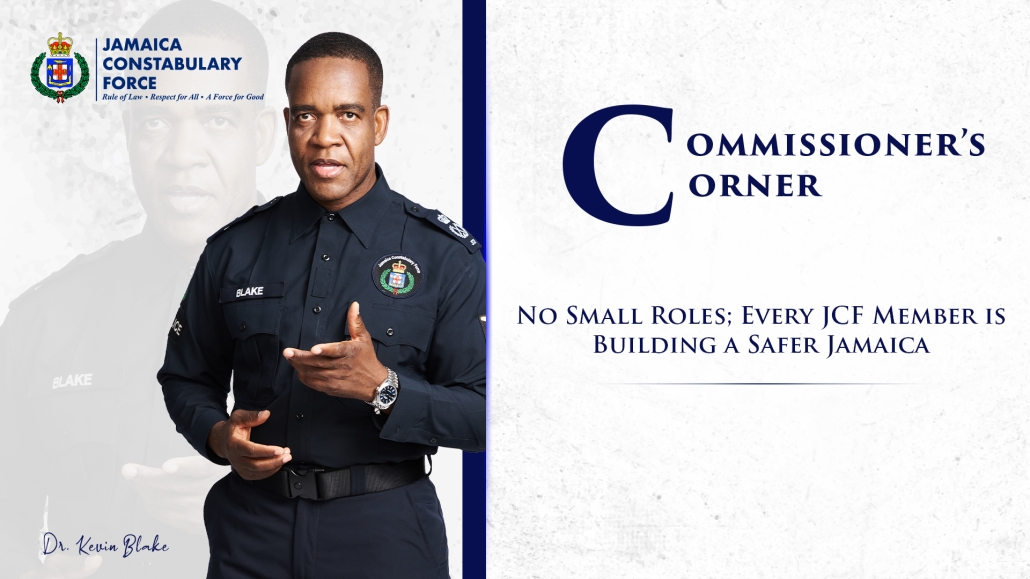
No Small Roles; Every JCF Member is Building a Safer Jamaica
By any measure, Jamaica’s security landscape is undergoing a seismic shift—and not by chance. In his most recent Commissioner’s Corner, Police Commissioner Dr Kevin Blake reminds us that progress in the fight against violent crime is both measurable and deeply collective. While the statistics tell a compelling story of significant reductions in major crimes, including a 44% decrease in murders compared to this point last year, the deeper truth lies in how this progress is being achieved: through the disciplined, strategic, and purpose-driven contributions of every single member of the Jamaica Constabulary Force (JCF).
Too often, public sector success is framed as the outcome of high-level decisions or flagship reforms. But what the JCF is demonstrating, perhaps more vividly than any other agency, is that sustainable transformation hinges on institutional culture—on the daily actions and shared values of its people. “It means therefore that we cannot afford for any single member among us to not effectively deliver on the mandate,” Dr Blake writes. “Colleagues, the stake is high and so we will not rest until we totally break our country free from the stranglehold of violent crimes.”
This is not motivational fluff. This is strategy anchored in collective efficacy, which is the belief that individual effort within a shared mission amplifies institutional results. When the Commissioner asserts, “We are not just breaking stones, we are building a cathedral,” he is not merely romanticising police work. He is placing it within a broader paradigm of public sector transformation, where frontline service delivery is elevated to the status of nation-building.
In an era when institutions worldwide are facing legitimacy crises, the JCF’s model offers a compelling counter-narrative: an organisation that is both introspective and outward-facing, pursuing measurable results while investing deeply in its human capital. From detectives in urban divisions to clerical staff in rural stations, from High Command meetings to midnight patrols, every task contributes to a system of enforcement that is now seeing global recognition.
Indeed, that global recognition is not symbolic. The recent decision by the U.S. Department of State to downgrade Jamaica’s travel advisory from Level 3 to Level 2 carries profound implications, not merely for tourism revenues, but – more generally – for the country’s international standing. “The spin-off benefits of this level of reduction in major crimes are many,” the Commissioner notes. “One of which is the recent decision by the U.S. Department of State… sending a clear signal that the work we are doing is making a meaningful impact; both at home and abroad.”
What sets this moment apart is the Commissioner’s effort to tie macro-level outcomes to micro-level contributions. In so doing, he blurs the traditional divide between strategy and service, between leadership and labour. This is not a command-and-control model of governance, but a participatory one, rooted in the ethos of shared responsibility.
By drawing attention to regional success stories, like the St. James Division recording a single murder in a month for the second time this year, Dr Blake is also reminding us that place-based policing strategies are working. He singles out Area 1 and its constituent divisions, including Trelawny and Hanover, for posting some of the most dramatic reductions in violent crime. These pockets of progress serve as empirical validation for the JCF’s current approach—an approach that blends data, discipline, and deep community engagement.
Importantly, Dr Blake’s commentary never loses sight of the human element. His closing remarks are not administrative boilerplate, but a genuine appeal to officers’ personal well-being. “I wish for you and your families a blessed and peaceful weekend,” he writes. “Please find some time to bask in the company of those who matter most – your families.” This is a nod to the reality that no system – however technically sound – can endure without caring for the people who run it.
In this way, the JCF is modelling what public sector transformation should look like: outcomes-based but people-driven; ambitious but grounded; strategic yet deeply humane. The Force’s progress is a governance story. And in the quiet synergy between effort and impact, the JCF may well be pointing the way forward for public institutions across the Caribbean and beyond.







